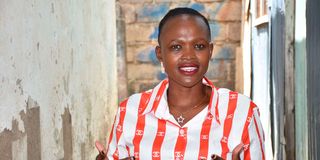Adolescents should not be denied information on sexual and reproductive health

Jeronime Obwar is the CEO and Co-founder of Youth Empowerment on Strategic, Advocacy and Mentorship (YESAM).
Jeronime Obwar, 32, is the CEO and co-founder of Youth Empowerment on Strategic Advocacy and Mentorship (YESAM). It is an organisation that seeks to empower adolescents with information on sexual and reproductive health and rights while advocating for youth friendly centres where young people can access this information without fear and stigma.
Jeronime, who envisions a society with better healthcare systems, was recently nominated ACT Alliance regional youth representative for Africa, a forum that enhances youth participation in decision making spaces.
What does your organisation do?
YESAM basically works to empower adolescents with information on reproductive health and rights. These we do through sensitisations and dialogues around gender-based violence, prevention and response, the legal framework to justice and referral pathways to justice.
On menstrual health management, as it is, puberty comes with many challenges. I advise parents or those guiding adolescents to develop a close relationship with their children during this time. Children fall off during puberty and further get lost when not given keen attention. We also offer peer to peer dialogue and support girls and young women by distributing sanitary towels, soap and underwear, as well as underwear and soap to boys. Besides talking about menstruation, we also talk about early pregnancy, unsafe abortion, HIV, harmful cultural norms and sex.
What attracted you to working with adolescents?
I was born and raised in the informal settlement of Nyalenda in Kisumu. I have seen adolescents go through challenges, some of which timely information could have prevented.
I found out that information is power, and I thought that if young people were empowered with relevant, correct and consistent information, then at least some of these challenges could be minimised. School dropouts had been the order of the day, few young people completed school. Some would get pregnant at the wrong time and get married. How then could we get professionals from Nyalenda if most would give up along the way due to avoidable circumstances?
What are some of the emerging issues in the sexual and reproductive health and rights sphere? How is Kenya working to counter this?
The issues under SRHR are unavailability, inaccessibility and unaffordability of SRH commodities. Deficient budgeting, inadequate youth-friendly centres with youth-friendly services free from stigma and discrimination. Another is misconceptions of what SRHR is all about by the community. There are policies, but the implementation is poor. Prevention mechanisms to deal with the causes of these issues are also weak. This said, Kenya has tried by putting up SRH policies.
In terms of budgeting, some budgets have been allocated under Reproductive, Maternal, Newborn, Child and Adolescent Health (RMNCAH), with continuous advocating for proper utilisation of these budgets and also to have specific vote heads for SRHR related issues. These have been possible through technical working groups and other civil society organisations.
Your organisation works in the slums where issues such as transactional sex and teenage pregnancies are common. Are there any short and long-term solutions?
Putting more focus on prevention rather than curative response. Curbing teen pregnancy is all about information sharing. Empower young people with correct and consistent information, talking about sex or contraceptives should not be taboo. We need to be real with adolescents, have honest and candid conversations as this empowers them to make informed decisions.
What are some of the best practices in the health sector in other countries that can we borrow from and implement in Kenya?
Team work and intentionality. Putting more effort in whatever you are working on, researching and working together with people to get solutions.
I borrowed the concept of sisterhood sharing. Sisterhood is a philosophy that basically focuses on collective actions. Dig; understanding yourself, being honest with yourself. Bridge; connecting with others. Collective action-amplifying others’ efforts as you work towards equality. That if we intentionally come together we will dismantle the systemic inequalities.
What are some of your notable achievements in policy advocacy and reviews?
Work on policy and budget advocacy. I took part in the Kisumu County SGBV policy formulation and SRHR strategy paper, and also family health operations plan and family planning policy brief. We are part of the team that came up with the community scorecard on SRHR, and currently part of the team that's coming up with the Kisumu County Youth Policy.
In what other capacities do you serve your community?
I am excited that I am directly serving my community in matters of development. An example is the recent election of the management team of the K’owino Health Facility in Nyalenda. This is a unique opportunity as I believe it will create very visible change. To be publicly voted in by the community is not something to be taken for granted.
Our mothers need not travel long distances to deliver at other facilities, yet we have the capacity to make our grassroots development projects see the light of the day. Our people need not travel long distances to have their blood pressure tested, HIV tested, family planning administered yet we have a health facility in the community.
Your parting shot?
A country that does not put young people at the centre of decision making is a disabled one. We cannot afford to keep trying to fit young people into already designed projects, they should be part of these projects from the beginning. Young people are assets, not liabilities.





